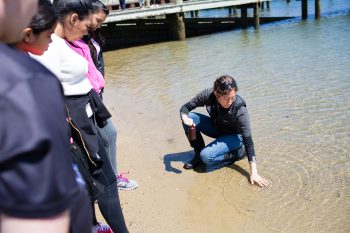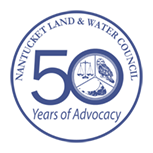 The Nantucket Land & Water Council is pleased to announce its twenty-seventh year of financial assistance to Nantucket students and teachers in grades K-12 via the Karen K. Borchert Educational Grant Program to conduct science and environmental projects. Our goal is to encourage students’ understanding of their local environment through direct involvement in project-related activities. The intention of this program is to help teachers enhance their curriculum with alternative learning tools (materials or activities).
The Nantucket Land & Water Council is pleased to announce its twenty-seventh year of financial assistance to Nantucket students and teachers in grades K-12 via the Karen K. Borchert Educational Grant Program to conduct science and environmental projects. Our goal is to encourage students’ understanding of their local environment through direct involvement in project-related activities. The intention of this program is to help teachers enhance their curriculum with alternative learning tools (materials or activities).
Awards will be made based on the following criteria:
- Project’s ability to enhance students’ science/environmental learning process
- Project’s direct connection to students’ curriculum
- Sustainability of grant (Will it benefit students for years to come?)
- Budget documentation (Are costs well-substantiated; are equipment purchases defined, etc.?)
- Track record of grantee (History of grants received; previous project outcomes; reporting performance, etc.)
Project proposals may be submitted by an individual or team of teachers. High school students, in cooperation with a teacher-mentor who will supervise the project, may also submit proposals.
Grant proposals should be submitted to RJ Turcotte at the Nantucket Land & Water Council. The grant application can be found HERE.
If you have questions or would like further information regarding this opportunity, please email RJ Turcotte, NLC Resource Ecologist.
Karen K. Borchert Educational Grants
Since 1993, the NLC has awarded environmental awareness and science project grants to local students and teachers. Our goal is to encourage students’ understanding of the island environment through direct involvement in project-related activities. At the end of each year, Resource Ecologist Emily Molden works with the Education and Research Committee to review applications and award the grants.
The NLC is pleased to announce that our annual school grants program has been re-named the Karen K. Borchert Educational Grants in honor of Karen Borchert and the dedication she had to all of our educational programs during her tenure with the Land Council.
Past Karen K. Borchert Educational Grant recipients:
Allison Gayo from Nantucket Lighthouse School for Extended Day Classes Materials: To foster Lighthouse students’ engagement with the outdoors and extend their curiosity and learning the students will collect and examine various insects and plants they find in their schoolyard. With these materials, students will have the opportunity to accurately identify their discoveries and learn more about them through research. Students will also creatively document their findings with their own observation notebooks and art supplies. A plant press will teach students how to properly collect and label their findings. After-School Nature Exploration will help foster an early appreciation and interest in nature observation, entomology and plant identification. Through the use of guide books and stories, students will increase reading skills and comprehension
Linda Ballinger & Joni Amaral from Nantucket Lighthouse School for Engineering and Circuit Kits: The kits give children a hands-on introduction to electronics. Kits include all of the components required to design and build hundreds of different electronic projects. Components include snap wires, slide switches, resistors, capacitors and a plastic grid for arranging the components. Students can work from an included design guide, or invent projects of their own.
Rain Harbison from Nantucket Lighthouse School for Educational Garden Materials: To continue to engage children in our planet’s natural beauty and to help them understand their impact and responsibility to the world around them they will use the following supplies: wire compost bins, garden tools and gloves, seeds and soil for planting, grow lights and a plant stand, plug trays and window boxes for starting seeds and a small wooden storage shed for safe and secure tool storage.
Rachael Sullivan from Nantucket New School for Nature’s Classroom Field Trip Support: The basic objective of the field trip is for students to feel comfortable leaving home for several nights, traveling with their classmates and teachers to a new environment to learn outside the classroom walls. Students learn how to work together in group challenge activities and by taking turns serving and cleaning up from meal time. The lessons learned in the classroom will tie in specifically to lessons on matter, energy, forces and motion, and sound and light.
Amanda Bardsley from Cyrus Pierce Middle School for a Weather Station: In the unit on the interaction between water and air, students will use the weather station to collect data and identify patterns in air mass interactions and the impact on local weather. Over time, we will be able to use data collected from the weather station to make connections between weather and climate.
